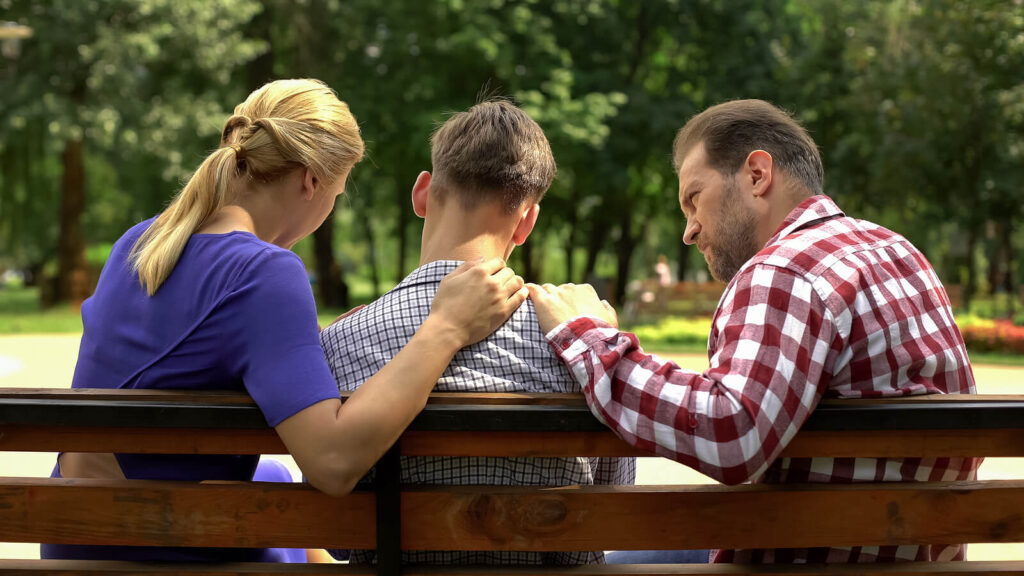
Maintaining relationships with family members after neglect, abuse, or estrangement can be difficult. There are often a lot of hurt feelings, anger, and resentment that need to be addressed. However, it is possible to repair broken family relationships. Doing so can provide a sense of closure and allow you to move on from the pain of your past.
In this blog, we will be breaking down my discussion on Repairing Broken Family Relationships from my Therapy Chat Podcast, Episode 328 with Laura Davis, the author of the classic book on sexual abuse, Courage to Heal. We will be talking about estrangement and reconciliation with a parent who was not there for you, the way that you needed them to be in childhood.
As a disclaimer, in this blog, we will be mentioning traumatic childhood events such as sexual abuse. I encourage you to trust your instincts and to stop reading if you believe that this will be triggering for you.
Estrangement
Estrangement from a parent can often be the result of abuse, neglect, or trauma. This can leave children feeling abandoned, unsupported, and unloved. Especially if this parent was someone you trusted when you tried to report the abuse, and they didn’t believe you or worse, blamed you. As an adult, you may still have a lot of unresolved hurt and anger towards this parent.
Even if the family member was not the one who abused you directly, it can interfere with relationships.
When a child discloses abuse to their parent and is not believed, it can cause a lot of harm to the child. The child may feel isolated, alone, and like they cannot trust anyone. It can also lead to behaviors from the parent such as gaslighting, which is when a parent dismisses or minimizes the child’s experience, making them question what is real. This can further damage the relationship and the child’s sense of self. If someone behaves in an abusive manner towards you, you do not owe it to them to maintain a relationship (although children seldom have this option). It is healthy to set boundaries with people who abuse you. For safety, you don’t have to continue a relationship with anyone who has harmed you. This is where parental estrangement can be a good thing, it can help you to protect yourself.
How Can Estrangement Help?
Cutting off contact may be effective for relieving the stress of the interactions for the person who was victimized. However, over a lifetime, it can seem difficult, or even impossible to cut off or limit contact with someone who has been such a significant person in your life. And, there may be parts of them that miss having relationships with family too. So, it’s not as simple as just cutting ties and that’s the end of it.
This is a topic that affects many people. Most of us whose parents grew up in the 20th Century were raised by people who didn’t understand children’s emotional needs, just like their parents didn’t. Many people have not-so-positive relationships with their parents. Only you know what it was like for you to grow up in the family that raised you, and even if others in your family see things differently, you have the right to communicate your needs and boundaries. Whether your reason for considering estrangement is because you feel misunderstood or mistreated by your family, you’re not alone in the way you feel. Being abused and/or ignored during childhood does have long-lasting effects and is incredibly harmful to family relationships. The good news is, it’s never to late to heal, even if those family members are no longer living. Trauma therapy helps.
What is the Process of Reconciliation?
Reconciliation can sometimes be possible, but it is not always easy or safe. It is important to remember that you have a right to protect yourself and to set boundaries. However, it becomes more complicated than that. You may be thinking, “when is it appropriate?” or “when is it best to just hold boundaries and never breach them?” But, the answer is that there is no one size fits all answer. Everyone’s situation is different. An important consideration is to make a decision from a grounded place.
Types of Reconciliation for Repairing Broken Family Relationships
When we think about reconciling with an estranged family member, many feelings may arise. You might wonder, “Okay, what does that look like? Is that even possible?” So here are a few examples of what reconciliation might look like.
Deathbed Reconciliation
This is the kind of reconciliation scene you may see in the movies. Typically the ones who are estranged come to visit the parent who is dying. This type of reconciliation is where there’s this mutual healing. It usually leads to transformation and this real intimacy in the relationship. It’s either renewed or established for the first time. Then all the past hurts are resolved and both people experience closeness and renewed growth and ease.
Although that does happen occasionally, it’s the rarest form of reconciliation. It’s unusual. Even though this type of reconciliation is one we crave and hope for, it is often a fantasy that we wish for, more so than the norm.
Changing the Frame of Reference
This is when one person changes their frame of reference and expectations. This is so that their perception of the relationship and its possibility opens up. However, it depends on whether or not the other person changes. If they don’t, then this doesn’t work. So, it takes two people to make it happen. One person may change their mindset, but if the other doesn’t, it doesn’t work.

Unresolved Feelings
This type of reconciliation is where both people still have unresolved feelings or are ambivalent. However, both parties agree to disagree and establish some kind of ground rules. This establishes a limited but pleasant relationship. This would mean you could do something like attend the same wedding together. You know, without just completely choking on your food.
And in this scenario, the best you could hope for is peaceful coexistence. Not any real closeness. For example, you may have a parent that you’re estranged from, but then you have grandchildren. And so to see your grandchildren, you still need to have some kind of relationship, albeit a limited one with that parent.
Ending the Relationship May Be Helpful in Repairing Broken Family Relationships
The last type of reconciliation is no reconciliation. Perhaps, it’s impossible to have a direct relationship with the other person. Maybe the person is too abusive. They’re too toxic. In this case, the healthiest choice is to cut off the relationship. You may feel pressure from the outside and also from the inside to try to make this work. But, if it’s not safe and not possible, then it’s just not worth it. And, no one should ever sacrifice their well-being to maintain a psychologically devastating relationship.
You set this boundary and do the work you need to do inside yourself. But, you can send loving kindness to that person from afar. You can close the door, but you can leave the porch light on.
Focus on the Small Things
If your reconciliation is not going to look like the “Deathbed” scenario or even Changing the Frame of Reference, then it might look like this. You can focus on the small things. Like going to the movies together or out to dinner. Just things that can help you have some kind of common ground or connection. This doesn’t mean that everything is healed. It just means that you’re taking small steps to connect again. Or, you’re even agreeing to disagree.
If you’re able to set aside some of the past and just focus on the present, then this can be a great way to start rebuilding your relationship. However, if you can’t, then that’s okay too. You have to do what is best for you and what will make you feel safe.
Forgiveness vs Keeping the Peace
There can also be a lot of pressure to forgive and forget. And, while forgiveness is important, it’s not always possible. Sometimes, people say “It’s in the past, I’ve forgiven them.” But, they haven’t done anything to make that happen. They are smoothing things over somehow for the sake of “keeping the peace”. This is denying the other person in this relationship, who was victimized, of their experience. Sometimes people just say they’ve forgiven and they convince themselves they are forgiven, but internally, it’s all turmoil.
There’s a real difference between actual reconciliation and surrendering.
And, surrendering is like backing down because the consequences of holding onto the truth are too painful and you change your position to make things easier. Whereas, forgiveness is letting go and moving on. It’s differentiating yourself from the hurt that was caused to you… So, you convince yourself that it’s not that bad and that you’re just going to forget about it.
However, you end up sacrificing yourself. Which is very different from just saying “I don’t want to fight about this anymore.” That’s not the same thing as forgiveness. It’s false forgiveness. In fact, it’s smoothing over and “keeping the peace”. It’s really important to say that reconcile if there is going to be any kind of reconciliation, it is not at the beginning of the healing process.
You Have to Heal Yourself First to Begin Repairing Broken Family Relationships
You have to do your deep healing work first before you could even consider the possibility of reconciliation. Grief and anger are just as essential to the reconciliation process as compassion and love. Yet, there is a lot of pressure to force forgiveness. “It happened a long time ago.” “Let go of the past.” We have to first make that separation and set those boundaries. For many people, a healing separation is necessary. And, it could be weeks, months, it could be decades. There has to be a time when you learn who you are separate from that family system and establish your separate autonomy.
Only when you have to have a separate self to reconcile with and you can’t reconcile with someone you’ve meshed with that the scales can rebalance. There’s a process of rebalancing the scales and reclaiming your power and agency before this kind of work could even be considered. You have to rebuild yourself into a person who was not capable of being hurt in the same way.

Find a Trauma Therapist Near Me Who Understands How to Begin Repairing Broken Family Relationships
It can be really difficult to work through these issues on your own. Experiencing abuse or trauma within your family system can take a toll on your mental and emotional health. However, you don’t have to go through this alone. Working with a trauma therapist can help you to process and understand your trauma. They can also help process estrangement or reconciliation if that is something you’re interested in pursuing.
If you’re considering therapy, you can find an experienced trauma therapist near you by clicking here.
Therapy Chat Podcast
If after reading this blog you’re interested in learning more about childhood trauma, you may want to check out our Therapy Chat Podcast. In the podcast, I cover topics where we focus on “the bottom-up” approaches to trauma. Additionally, our Trauma Chat Podcast has great episodes about trauma, too. In one episode, I even talk about what Trauma is and how negative experiences in childhood can be traumatic over the lifespan.
Podcasts and blogs may not be a replacement for therapy, but they do give you the power and knowledge to work through difficult experiences. They can also be useful resources while you’re looking for a therapist. For many people, it can also be helpful to learn more about trauma while they’re in therapy to get a deeper understanding of their experience. We hope that this information is helpful to you. Remember, healing is possible and you don’t have to go through this journey alone.




